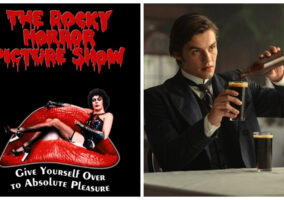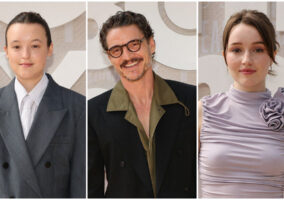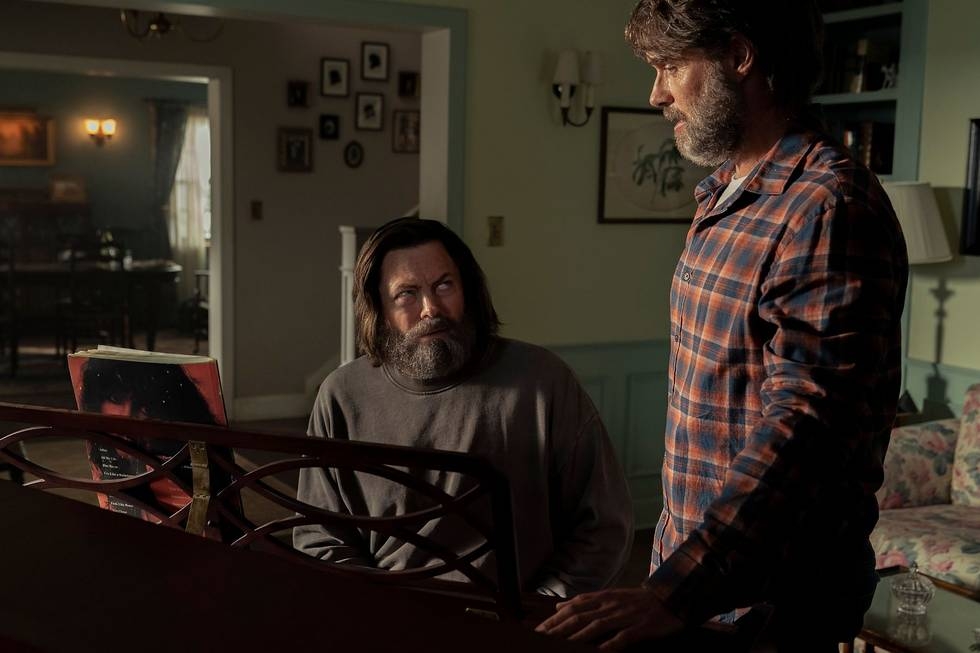
For us, it was the strawberries.
The point to any story about living through an extinction event is to criticize every dumb thing the characters do and imagine how much better you’d be at apocalypsing if you were there. In this stunning episode, writer/executive producer Craig Mazin and director Peter Hoar gave you the aspirational do-everything-right figure anyone would want to be in this tale and then did something surprising and beautiful with him. Watching survivalist Bill (Nick Offerman) create his own oasis inside the apocalypse, breaking into Home Depot for supplies, chopping down trees, smoking his meat and enjoying wine with his meals – this is the ultimate fantasy for any viewer of these kinds of shows. What if you survived the zombie apocalypse? Or a virus that wiped out civilization? Or an alien invasion? Or a plane crash in a deserted location? Or a nuclear war? What would you do? How would you contribute? Defend yourself? Survive? What would your life be like? “If I survived the zombie apocalypse, this is exactly what I would do,” we all would like to think. But actually, we don’t all think that when we watch certain stories, do we? We don’t all get to. Not to put too fine a point on it, but we think a lot of queer people who love these stories might reasonably conclude in their what-iffing that such scenarios would probably not be all that welcoming to them, specifically because of their queerness. After all, if we’re talking totalitarian governments, militias, marauders and enslavers, as we are with The Last of Us – well, these are generally, historically not groups of people who tend to be all that open about, say, the gender non-conforming. Which in these scenarios, would be trans people, nonbinary people, the types of women who don’t show the proper level of interest in men or the types of men who’d rather wield a paintbrush after the world collapses than a gun, if someone would just give them the space to make things better and and not kill them. Which isn’t to say we don’t enjoy these types of stories when they’re done well, or even that we can’t play “What if” in a fun way if we wanted to. Believe us, we never sat through a season of The Walking Dead wondering why we weren’t seeing more bickering long-term gay couples into fashion and pop culture. But we’d be lying if we didn’t say we’d usually come to the grimly hilarious conclusion that the two gay fashion bloggers would probably be the first cast out of the group, put up against the wall, or eaten in most of these scenarios.
When Brokeback Mountain came out, it was something of a revelation to see two cis white male leading men struggle with the kinds of identity issues, self-loathing, and severe social backlash that almost all queer people have felt at some time or another, while placing them in a poignant love story with some fairly hot action to boot. The film exploded all over the zeitgeist largely because of the novelty of seeing queer men occupy such an iconically masculine American figure as the cowboy. Almost immediately, the film’s defenders (because of course it got attacked) – including some of its stars and creative crew – commented that they didn’t see it as a gay story, but a universal one about love and loss and blah blah blah. We’re sorry, but no. It pissed us off at the time that people would deny the specific fucking queerness of the story; not just the buttsex, but the self-loathing and what happens when queer men come up against the rural American deification of traditional white manhood. Brokeback Mountain wasn’t universal at all. It was quite specifically white, queer, male and American. Today, cis queer male love does not lack for depictions in popular culture, especially if they’re white men. There’s no way we can sit here and claim we’ve never seen some aspect of ourselves or our marriage in various onscreen depictions in the past decade or two. Part of the relatively minor backlash against Bros was because the film oversold its white cis male love story as being more revolutionary than even a lot of white cis queer men considered it (these two included). After a while, on the matter of representation you feel like the need to see yourself has either been satisfied enough or that you have reached the inevitable point where popular culture is going to reflect yourself back at you with less and less frequency as you age out of the most desirable advertising demographic. We can’t say we’d ever truly felt like we’d been neglected by not seeing more of ourselves in post-apocalyptic stories.
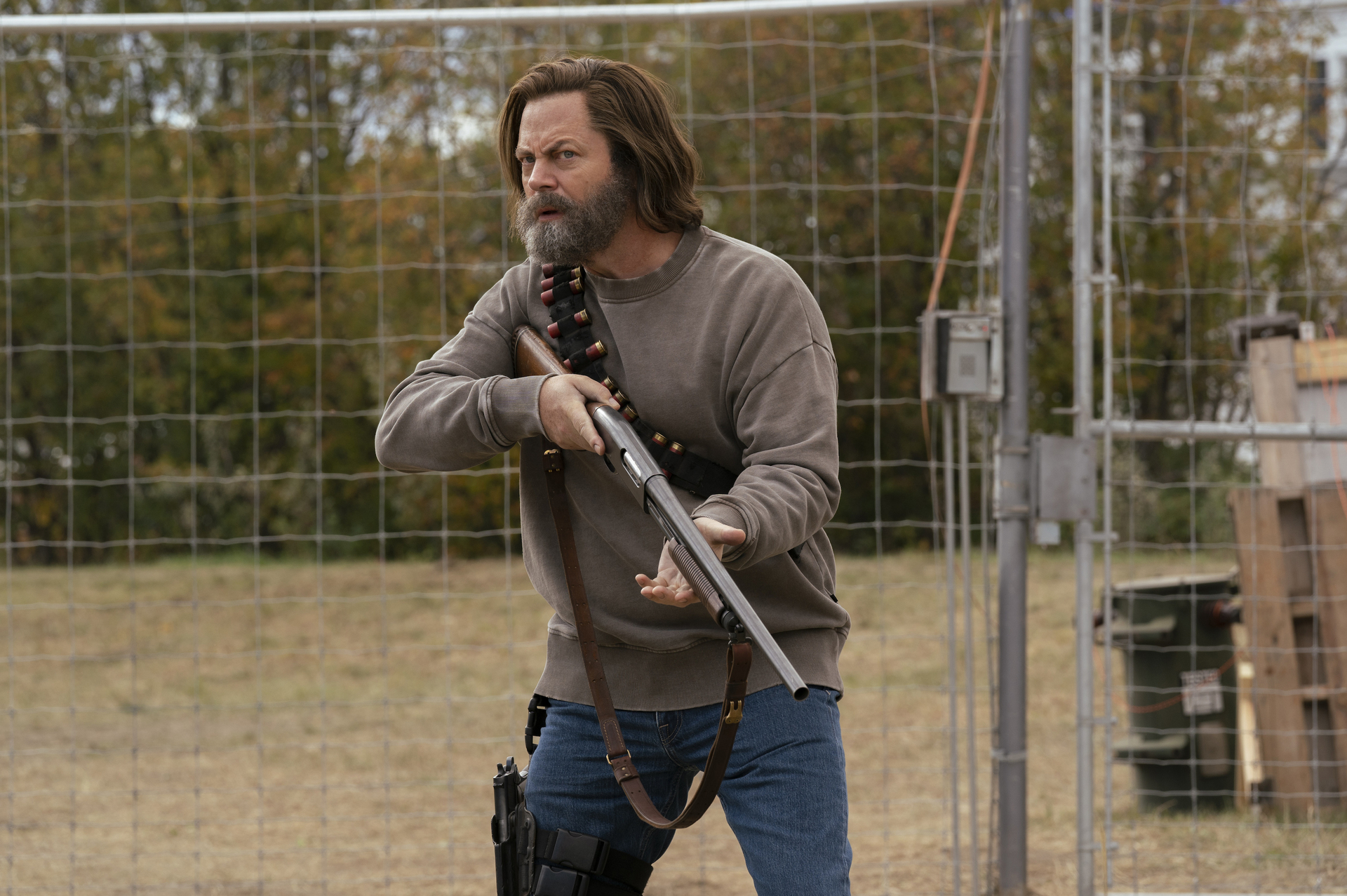
But there was something lip-quiveringly, eye-wateringly delightful to us watching two middle-aged gay men survive the apocalypse by singing Linda Ronstadt songs, arguing about paint colors, taking care of the house, and apologizing for getting old faster than the other one. In other words, with this episode, we watched ourselves thriving at the end of the world, an image so foreign to us that we never really noticed its glaring absence in our imaginations. We didn’t admit this to each other until well after we watched it, but when Frank announced his plans to terminate his life on his own terms each of us immediately thought, “If it were me, in that scenario, I would so fill my own glass and go with him.” Now, we think just about any couple in love would find themselves thinking the same thing, so we’re not claiming special status. There were several moments that made us cry, but the one that reduces us to weepy puddles is when Bill bites into his first strawberry in a decade and giggles like a little girl. Do we need to see ourselves – specifically us – in stories like these? We might have said no or not really before this, but we don’t think we can quite describe the feeling of seeing two middle-aged gay men in love, in the apocalypse, giggling over strawberries. Because yes, that is absolutely something we would do. We’re writing this well before the episode airs and we know damn well some of you reading this have headaches right now from crying so hard. We also know a great deal of you aren’t gay or queer. Yes, this is a universal story about love and survival. This is also a story that did a stunning job depicting a very specific version of gay life. It can be both.
Amazingly, this 75-minute episode not only told the entire tale of a nearly two-decade love story, but it advanced Joel and Ellie’s relationship significantly and it filled in even more details about the state of the world and how it got that way. We remain extremely impressed by the tightness and emotional depth of the scripting. Ellie confronts Joel at the top of the episode and demands that he not blame her for the decisions he made that led to Tess’s death. You can tell he respects her for it. On the hike to Bill and Frank’s, they bond as she teases him about the scar on his face and his sharpshooting abilities. Given how considered the scripting is, we think it says something about this world that they both got over Tess’s death rather quickly. Ellie asks for a gun again and he shoots her down (no pun intended) again. They stop at one of Joel’s stash points to switch out guns, Ellie finds a trap door which leads her to a hidden basement. It all feels very game-play – hidden stashes, secret doors in the floor – in a clever sort of way that doesn’t come off gimmicky. In the sub-basement, she encounters an infected trapped by some rubble and, in a rather creepy moment, slowly slices his face open before killing him. What makes the scene so disturbing is the way the infected watches her do it, as if he were more aware situationally aware than we’ve been led to believe. She snags some unopened tampons, which she triumphantly waves in Joel’s face; another really nice touch that acknowledges what it’s like to live in this world, especially for people other than the male leads. Later, they come across the old wreckage of a plane. As she was at the site of an old videogame, a hotel lobby, the interior of a car, she is fascinated by this artifact from a world that seems like a fantasy to her. “Dude, you got to go up in the air.”
She gets another expositional history lesson as Joel explains exactly what happened to cause the pandemic. As we noted in the first episode recap, Joel forgot to pick up pancake mix, and as we noted in the second episode recap, this was almost certainly tied to the reveal that the initial outbreak happened in a grain and flour factory. Not only do we get confirmation of this in Joel’s tale, but the fact that he pauses when he mentions pancake mix seems to indicate that he’s thought about that detail a lot over the years. They come upon a pit of skeletons and Joel reveals that the soldiers rounded people up in the small towns, and when they couldn’t find places for them in QZs, executed them to prevent the further spread of the infection. Joel of course does not so much as hint at the fact that his daughter was killed by one of these soldiers. Not to sit here and defend the actions of a totalitarian government that, in the rather pointed words of Ellie, “failed to prevent a pandemic,” but given Dr. Ratna’s advice to bomb Jakarta until everyone in the city was dead, or Dr Neuman’s 1968 warning that a fungal epidemic would spell the end of humanity, it could be argued that the show is presenting these concepts and actions as, if not necessarily morally neutral, at least rooted in somewhat inarguable thinking. On the other hand, that cut from the two faded print fabrics (flowers and rainbows) in the pile of bones to their original bright and new states on the mother and baby who wore them is devastatingly dark.
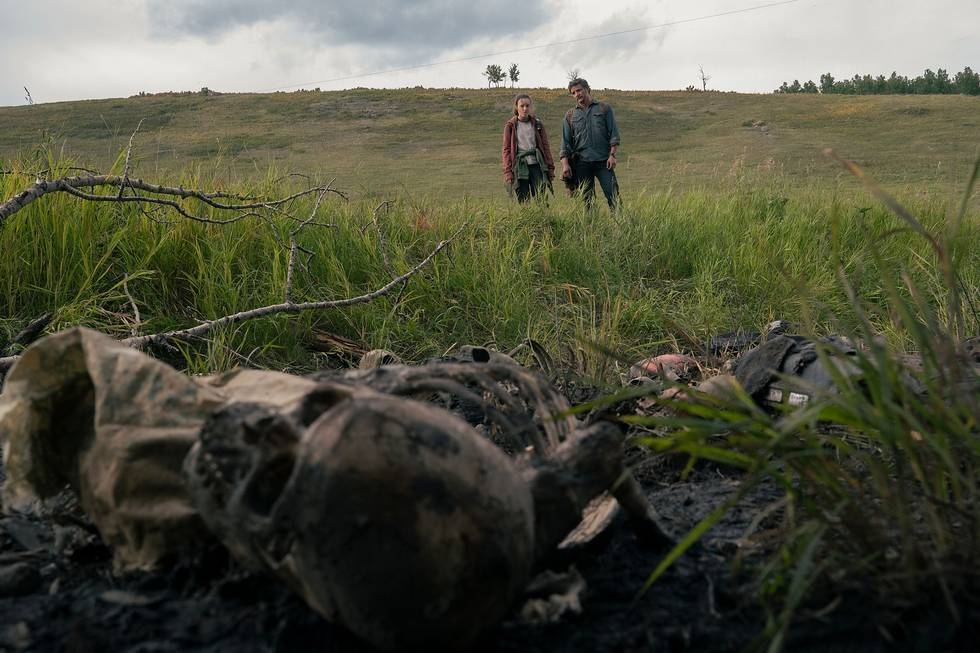
This was the opening of a fantastic segue into the Bill and Frank story. We’d like to unpack a few things for you that seemed obvious to our gay asses. Bill immediately goes tender when he sees Frank, even though he’s got a gun pointed at him. We think it’s not entirely out of the realm of possibility that Bill’s immediate attraction to him is what saved Frank’s life. That and the fact that Frank clearly presents no threat to him, but still. Watch Offerman’s face when he sees Frank for the first time. That is the face of a repressed gay virgin who just watched Murray Bartlett climb out of his trap. Bill still wants him to leave, but you can see the slowly burgeoning flirtation if you know where to look. “I haven’t eaten in two days,” Frank tries for pity, but immediately resorts to self-deprecation. “It doesn’t sound very long out loud.” Then, he switches to sass: “Arby’s didn’t have a free lunch. It was a restaurant.” One of his ploys must have hit the mark, because Bill not only relents to feeding him, he offers him a shower and puts on quite the show for him, presenting him with a 5-star restaurant-worthy meal. Bartlett is hilarious portraying Frank’s gleeful shock at the dinner prepared for him. It’s all a little dance. Bill turns the plate for the correct presentation. Frank compliments Bill as the type of man who knows how to pair wine. Bitch, this is how middle-aged gay men flirt. The fact that Frank could so easily convince Bill to sing for him suggests both how lonely Bill has always been and how much he’s attracted to Frank. His rendition of “Long Long Time” is lovely. He plays the song and interprets the lyrics with the kind of gentleness that indicates the many times he pulled that sheet music out to play his way through his loneliness; years and decades of living in his parents’ house and building his little fortress in the basement, shutting out the world and sneaking up every now and then to quietly play his heartbreak song. Frank’s flirtation goes from mild (if not manipulative) to something deeper. Offerman is astounding as Bill opens up to Frank’s touch. The way they grip each other tightly as they realize that they found one another. In all of this. We laughed when Frank broke away from the kiss to ask Bill’s name, which is, shall we say, a not uncommon experience in gay male socializing. We also laughed at him ordering Bill to take a shower, because whenever two people kiss or have sex in one of these apocalypse stories, one of us will inevitably say “Imagine how gross their breath is” or something to that effect. But we can’t even tell you how hard and how loudly we laughed when this scene of exploratory tenderness and vulnerability cut to an “Oh, FUCK YOU” and a “Three Years Later” title card. Ah, there we are. There’s us. That it turned out to be an argument over budgeting and redecorating could not have been more perfect.
The great thing about this male love story is that it encourages looking past stereotypes about gay men (Bill the survivalist, the hunter, the craftsman) but also kind of pays homage to some of those stereotypes (Frank the decorator, the artist, the sassy sensitive). “Paying attention to things. It’s how we show love,” he explains to Bill. We understood what he meant in our bones while also marveling that we’d hear that kind of sentiment in a story like this. He also reveals that he’s been talking to a nice lady on the radio, which leads to the other huge laugh from us, as we cut to Frank all but hissing “Could you not, please?” at Bill as he pours the wine for their guests, an exchange we proudly admit to occurring countless times in our marriage and one that we’ve seen play out so many times when gay couples entertain that we can safely call it a universal gay marriage moment. Anyway, enter Joel and Tess (2010 editions). We’ve already seen a younger Joel, but it’s a bit of a shock seeing Tess with quite a bit more of civilization still clinging to her. It’s not that she’s younger, it’s that she clearly hasn’t been through the shit that made Tess the much rougher person we first met. Anna Torv gives you just enough in this brief scene to make you wonder who she was before all of this happened. Bill and Joel don’t exactly hit it off, but they come to an uneasy understanding that they can help each other out. Joel puts on his old contractor hat and assesses the infrastructure surrounding Bill and Frank’s compound, noting all of the ways he can help him with materials. Joel warns Bill that eventually, raiders will come for them. “We’ll be fine,” Bill assures him. As he seems to be about so many things, Bill was absolutely right in this one.
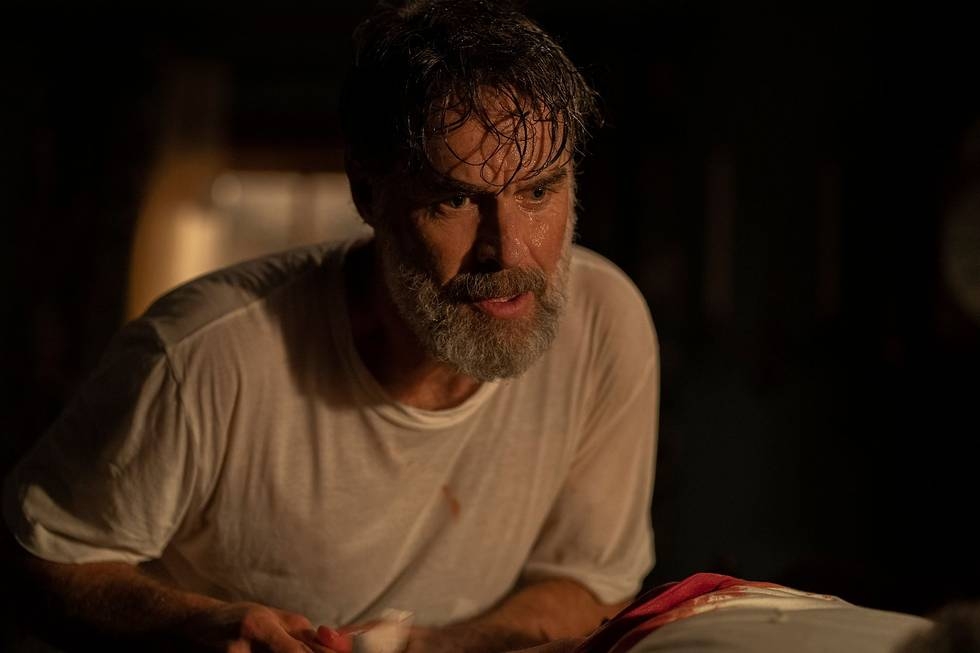
Oh, sure. The raiders came. They even did some damage and for a minute there, it looked like the Bill and Frank story was ending. Bill tries to impart every bit of advice and information to Frank to ensure his survival after he’s gone as Frank works feverishly – and rather confidently – to save his partner’s life. Paying attention to things. It’s how we show love. How poignantly devastating to see the scene cut to a TEN YEARS LATER title card and a clearly dying Frank being tended to by a much older Bill. They survived, but they’re not going to continue. We knew exactly where the story was going from the second we saw Frank in the wheelchair. The scene where he pleads with Bill to assist him in ending his life is a tear-jerker for the ages and we simply can’t imagine that Emmy nominations aren’t forthcoming. Nick Offerman is so devastating in this scene it’s hard to look at him. We’re likely to see plenty of good television in 2023, but we doubt if any of it will top this episode.
When you’re young, you might find yourself wishing you could find someone with whom you can grow old. It’s a common enough wish for the relationship-minded and typically the end goal for most marriages. If you find that person, and you’re no longer young, you slowly realize exactly what the granting of that wish entails. There is both a beauty and an existential dread bound up in that realization. “I was never afraid before you showed up.” But there is also gratitude in that realization, and sometimes, for the very lucky, even peace with the eventual outcome. We saw an article earlier this month – from a gay media site, no less – that referred to the “tragic love story” coming up in the third episode of The Last of Us and we almost recoiled at the description. This was – every damn minute of it – the most triumphant of love stories. We didn’t cry because they died. We cried at all the beautiful parts of their living and how incredibly familiar it felt to us, from the graying beards to the arguments to the giggling to the weathered male hands gripping each other tightly in fear and in love. We cried so hard our faces got puffy and we wound up with headaches. But we are in absolute, vehement agreement on one thing: This was a happy ending. We were also in full agreement that, should Murray Bartlett wind up in one of our holes during the apocalypse, there is no question we would pull him out and give him a shower and dinner. “Definitely.” “Oh, absolutely.”
You know it’s a doozy of an episode when we gotta end on bullet points:
• Ellie finally got her hands on a gun, but did she also take the packet of ground up tranquilizers Bill left on the table? The editing made it look like she noticed it.
• We got an explanation as to why we were hearing Depeche Mode on Joel’s radio in the first episode. Bill has an automated playlist that switches to ’80s songs if he doesn’t reset it every few weeks.
• Ellie uses slang – “suck” and “cool” and “lame” – that seems lifted straight from an early aughts teen movie, which tracks, of course. Pop culture literally ended in 2003.
• We may never be able to hear “Long Long Time” again without getting just a little misty.
• Director Peter Hoar also directed all five episodes of the 2020 AIDS drama It’s A Sin, which had a similarly emotionally devastating effect on us, to which we devoted an entire podcast.
• “Not today, you New World Order jackboot fucks.” A line that only Nick Offerman could make sound cool as hell. As we noted in an earlier recap, the casting brilliantly plays on what you may already associate with the actors. Pascal is gruffly paternal, Ramsey is a teen badass, Nick Offerman is a survivalist and conspiracy theorist, Murray Bartlett is a refined gay man with a sharp tongue. Did we mention that Melanie Lynskey shows up next week?
• One nice little costuming touch: Joel came out of his shower wearing Frank’s plaid shirt from the “Oh, FUCK YOU” scene. It says something about him that Frank went to the trouble of keeping a good shirt in pristine condition – and ironed – in the apocalypse for nearly a decade and a half. See? Maybe a couple of gay fashion bloggers will be useful when it all goes to shit. Paying attention to things. It’s how we show love.
RUPAUL’S DRAG RACE: House of Fashion Next Post:
Paris Fashion Week: Stéphane Rolland Spring 2023 Couture Collection
Please review our Community Guidelines before posting a comment. Thank you!

